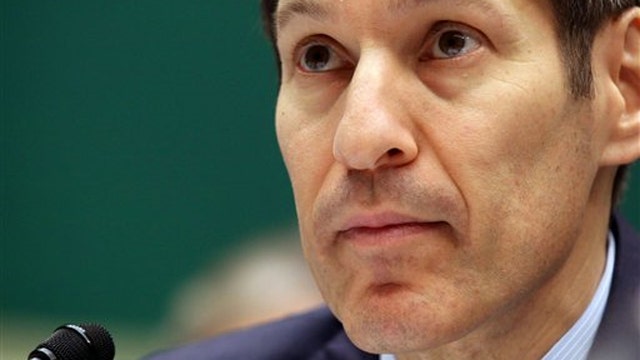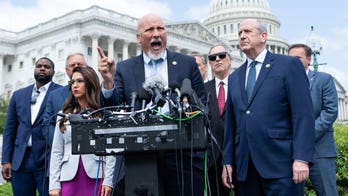Growing calls for CDC director Tom Frieden to resign
Was the government caught flatfooted by Ebola?
Confirmation that a second Texas health care worker has tested positive for Ebola is raising questions over whether the hospital and federal health officials really have a handle on containing the virus.
Top Obama administration health officials on Wednesday acknowledged that federal agencies should play – and should have played -- a bigger role in checking the spread of Ebola in Texas.
At a press conference Wednesday morning, Dallas Mayor Mike Rawlings also warned the situation “may get worse before it gets better” -- while assuring it ultimately will get better.
Such statements are a departure from the confident Obama administration claims just days ago that they would stop Ebola “in its tracks.”
Reflecting the urgency of the situation, the White House announced that President Obama would postpone plans to visit New Jersey and Connecticut on Wednesday for political events. He instead will convene a meeting of Cabinet agencies coordinating the Ebola response.
This comes after officials confirmed that the Texas patient also flew on a Cleveland-to-Dallas flight the night before being admitted, prompting a search for all passengers who were on that Frontier Airlines plane.
Ohio GOP Sen. Rob Portman urged calm in light of the news but said it demonstrates "why our government must be more proactive in the fight to prevent the spread of Ebola."
In Florida, Gov. Rick Scott said his state hospitals want to hear "directly from the CDC" on how to protect health care workers.
“The president, he's about two steps behind on everything, and then he just sort of does the Heisman,” Sen. Pat Roberts, R-Kan., told Fox News on Tuesday regarding the Ebola developments, before the latest diagnosis.
He added: “I don't care what protocols we have and the strain we are now putting on our health care system, all hospitals. You have human error.”
Roberts is among the lawmakers calling for a travel ban for affected West African countries, though the Centers for Disease Control and Prevention and other agencies say that would be counterproductive.
CDC Director Tom Frieden, though, rejected the notion that his agency has bad information.
“Our information is clear and correct,” he told Fox News on Tuesday. “But we do look at what happens and we adjust as we need to. We know how Ebola spreads. We know how to stop it.”
Frieden earlier in the week warned there may be additional cases in the U.S., after the first Texas hospital worker tested positive for the virus.
Asked Tuesday whether President Obama retains confidence in Frieden, White House Press Secretary Josh Earnest said: “He does.”
“[Frieden] is somebody who, in the last few months here, has been working almost around the clock to ensure that our response is commensurate with the challenge that is posed here. And the challenge that's posed is significant,” Earnest said.
However, Health and Human Services Secretary Sylvia Burwell said Wednesday that the federal government could have performed "much better oversight" of the Dallas hospital where two health care workers caught Ebola after treating the first U.S. patient with the disease.
Burwell told NBC News that the government is taking more steps to help prevent the spread of infection at the hospital, including more intensive training for workers and a 24-hour site manager to oversee how equipment is being put on and taken off.
She sidestepped questions about whether she had complete confidence in Dallas' Texas Health Presbyterian Hospital and whether the two infected workers should be transferred to one of four specialized hospitals. "We will keep all options and considerations right now," she said.
Anthony Fauci, director of the Institute of Allergy and Infectious Diseases, also said Wednesday: "What happened there [in Dallas], regardless of the reason, is not acceptable. It shouldn't have happened."
Fauci told MSNBC he envisioned the CDC taking "a much more involved role" in establishing the proper training protocols for Ebola cases.
According to officials, the worker at Texas Health Presbyterian Hospital reported a fever Tuesday and was put in isolation within 90 minutes.
Health officials said the worker was among those who took care of Thomas Eric Duncan, who was diagnosed with Ebola after coming to the U.S. from Liberia. Duncan died Oct. 8.
Meanwhile, nurses at the Dallas hospital are claiming that a haphazard and sloppy care system was maintained during the treatment of Duncan. The nation's largest nurses' union described how Duncan was left in an open area of the emergency room for hours. National Nurses United, citing unidentified nurses, said staff treated Duncan for days without the correct protective gear, that hazardous waste was allowed to pile up to the ceiling and safety protocols constantly changed.
RoseAnn DeMoro, executive director of Nurses United, refused to say how many nurses made the statement about Texas Health Presbyterian Hospital, but insisted they were in a position to know what happened.
Richard Carmona, former U.S. surgeon general, said nurses are often the “barometer” for how a hospital functions.
“We need to listen,” he told Fox News, “and take appropriate action.”
He voiced confidence in the information that the CDC is using to address the crisis, but acknowledged that skill sets may have faded in the lull before the outbreak. “You get a little complacent,” Carmona said.
The Associated Press contributed to this report.





